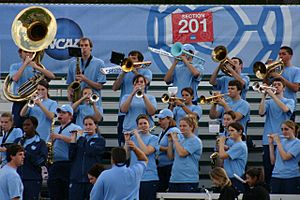Fight song facts for kids
A fight song is a short tune that cheers on a sports team. You'll hear this term most often in the United States and Canada. In places like Australia, Mexico, and New Zealand, these songs might be called a team anthem or team song. While they started with college sports, fight songs are now used by high schools and professional teams too.
Contents
What is a Fight Song?
Fight songs are like musical cheers. They let fans sing together and show support for their team. These songs are often played many times during a sports event. For example, a band might play the fight song when they enter the stadium. They also play it when their team scores a point. Cheerleaders might dance to it during halftime or other breaks. In Australian rules football, the winning team traditionally sings their song after the game ends.
A Look at Fight Song History
Many fight songs have a long history. This connects today's fans to traditions from the past. Often, a school's band plays the music. A study looked at 65 college fight songs. It found common words in their lyrics like "fight," "win," and "victory." Other popular parts of fight songs include mentioning the team's colors. They might also spell out the school's name. Words like "hail" and "rah" are also common.
Many songs were written by students, former students (alumni), or teachers. For example, the famous composer Cole Porter wrote "Bulldog" for his old school, Yale College. Some songs are made by putting new words to an old tune. Sometimes, they even use the tune from another college's fight song!
Famous Fight Songs
Hundreds of colleges have fight songs. Most of them came from the early 1900s. They became popular with the rise of American football. The very first college fight song in the United States was "For Boston." Boston College first used it in 1885. T. J. Hurley wrote and composed it. One of Australia's oldest fight songs is "Play Together, Dark Blue Twenty." It belongs to Melbourne Grammar School and dates back to before 1893. In 1997, USA Today newspaper picked the "Aggie War Hymn" as the best college football fight song. This song belongs to Texas A&M University.
Fight Songs vs. Other Songs
Fight songs are different from stadium anthems. Stadium anthems are popular songs played at games. But they are not written just for one specific team. Fight songs are also different from an alma mater or school song. An alma mater is a special song for an educational place. It usually has a slower, more serious tune.
 | Bessie Coleman |
 | Spann Watson |
 | Jill E. Brown |
 | Sherman W. White |


